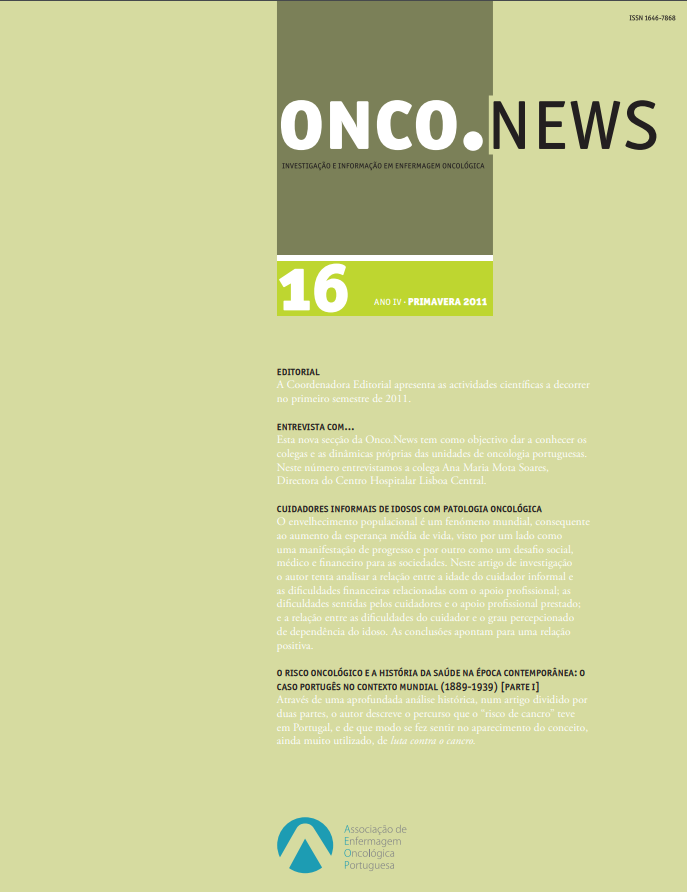Informal Caregivers of Elderly Patients with Cancer: Difficulties and coping strategies in the care process
DOI:
https://doi.org/10.31877/on.2011.16.01Keywords:
informal caregiver, caring, old people, oncologic disease, coping strategiesAbstract
Nowadays the population ageing process is understood as a world phenomenon and the increase in life expectancy is seen both as a sign of progress and as a social, medical and economic challenge. With the large increase in the number of old people it becomes obvious that the chronic diseases typical of old age also expand. One of those diseases is the oncologic one that is a crisis
factor that affects not only the old patient but also all his family structure.
This study aimed at finding out the needs of the informal caregivers of the old people who suffer from oncologic disease in the area of Hospital Distrital da Figueira da Foz, EPE and the coping strategies used to continue the caring process. This is a descriptive, co-relational and of quantitative nature study in which a sample composed by 65 old people’s informal caregivers was analyzed. Those old people are followed by the ambulatory care service, in HDFF, EPE. Semi-structured interviews to the caregivers were made. These interviews were based on a socio-demographic enquiry and the CADI and CAMI scales which aim at evaluating the caregivers’ difficulties and the coping strategies they use.
From the results available we may conclude that the old patients’ caregivers feel/find few difficulties in the caring process. The most evident difficulties are those related to financial problems, physical demands and deficient professional support. The coping strategies used are not very efficient and the most useful ones are those related to actions that have the objective of dealing with the situations and solving the problems.
There is a clear relationship between the informal caregiver’s age, the economic difficulties and the difficulties connected with deficient professional support. The difficulties felt by the caregivers and the professional support given is also related. There is also a clear relationship between the informal caregiver’s difficulties and the old patient’s degree of dependence perceived.
Downloads
References
ABOIM, S. (2003) – Evolução das estruturas domésticas. Sociologia, problemas e práticas. Nº 43, pp. 13-30.
BANDEIRA, A.(2009). Estudo de Avaliação das necessidades dos Séniores em Portugal. In Fundação Calouste Gulbenkian, Fórum Gulbenkian de Saúde sobre o envelhecimento 2008/2009. O tempo da vida. Cascais. Principia, pp. 135-149.
BRITO, L. (2001) – A saúde mental dos prestadores de cuidados a familiares idosos. Quarteto. Coimbra.
DECRETO - LEI n.º 118/92. D.R. I Série A. 144. (92-06-25) 3025-3027.
DECRETO - LEI n.º 79/2008. D.R. I Série A. 89. (2008-05-08) 2509-2510.
FIGUEIREDO, D. (2007) – Cuidados familiares ao idoso dependente. 1.ª ed. Climepsi Editores. Lisboa.
GIL, A. (2006) – Redes de solidariedade intergeracionais na velhice. In Cadernos de Política Social, N.º 1, Junho, pp. 92-113. Lisboa.
GIL, A. (2007) - Heróis do quotidiano: dinâmicas familiares na dependência. Tese de Doutoramento, Faculdade de Ciências Sociais e Humanas da Universidade Nova de Lisboa, Lisboa.
HEBERT, R.; SHULZ, R. (2006) – Caregiving at the end of life. In Journal of palliative medicine. N.º 9 (5), pp. 1174-1187.
HENRIQUES, A. (2006) – A sobrecarga do cuidador informal do idoso com doença oncológica. Relatório final de estágio da Licenciatura em Serviço Social: ramo da saúde. Instituto Superior Miguel Torga. Coimbra.
IPOPFG (2008) – Registo Oncológico Nacional (2001). Região Centro Portaria 35/88 de 16 de Janeiro de 2008.
LAGE, I. (2005) – Cuidados familiares a idosos. In Paúl C. & Fonseca A. (Coord.): In Envelhecer em Portugal. Manuais Universitários. Climepsi Editores. Lisboa.
LOPES, C.; PEREIRA, M. (2002) – O doente oncológico e a sua família. Climepsi Editores. Lisboa.
MARQUES, A. (1991) - Reacções emocionais à doença grave: como lidar. In Psiquiatria Clínica. pp.146, Coimbra.
MIRANDA, P. (2007) – Avaliação da sobrecarga do cuidador informal a idosos dependentes. Relatório final de estágio da Licenciatura em Serviço Social: ramo da saúde. Instituto Superior Miguel Torga. Coimbra.
NOVELLAS, A. [et al.] (1996) – Atención en la família. In Gómez – Batiste, X. [e tal.] Cuidados paliativos en Oncologia. Barcelona: Editorial JIMS.
OLIVEIRA, C. (1998) – O stress e o coping: e a formação em enfermagem? In Servir, vol. 46, Nº6.
PAVANIRI, M.; NERI, A.(2005) – Compreendendo dependência, independência e autonomia no contexto domiciliar: conceitos, atitudes e
comportamentos. In Duarte, Y. e DIOGO, M. Atendimento domiciliar: um enfoque gerontológico. São Paulo: Atheneu.
PIMENTEL, L. (2001) – O lugar do idoso na família: contextos e trajectórias. Coimbra: Quarteto.
REBELO, A. (1996) – Prestadores de cuidados informais a idosos com 80 e amais anos, na freguesia de Moreira da Maia In Geriatria. Ano 9, N.º 81 Janeiro, pp. 22-28.
RIBEIRO, O. (2007) – O idoso prestador informal de cuidados: estudo sobre a experiência masculina do cuidar. Tese de Doutoramento em Ciências Biomédicas. Instituto de Ciências Biomédicas Abel Salazar da Universidade do Porto.
SOARES, N.; LUNARDI, V.(2002) – Os direitos do cliente como uma questão ética. In: Revista Brasileira de Enfermagem, Vol. 55, N.º 1 Jan /Fev. pp. 64-69. Brasília.
SOUSA, L., FIGUEIREDO, D., CERQUEIRA, M., (2006) – Envelhecer em família: os cuidados familiares na velhice. Porto. Âmbar.
VALÉRIO, P. (2007) – A sobrecarga do cuidador informal do idoso em situação de dependência. Relatório final de estágio da Licenciatura em Serviço Social: ramo da saúde. Instituto Superior Miguel Torga. Coimbra.
Downloads
Published
How to Cite
Issue
Section
License
Copyright (c) 2023 Ana Filipa Pascoinho

This work is licensed under a Creative Commons Attribution-NonCommercial-ShareAlike 4.0 International License.




